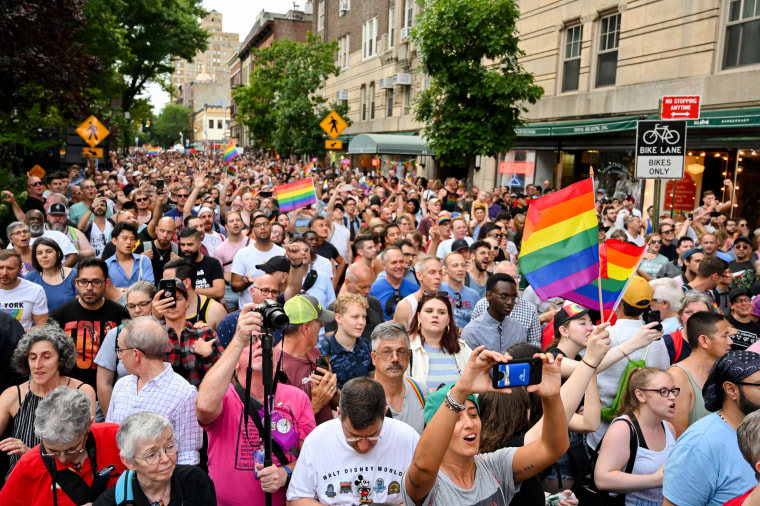After 27 dreary months of Covid-19 restrictions, which felled the past two years’ Pride celebrations, LGBTQ Americans are finally poised to fully celebrate their community on the public stage this weekend.
But in a stroke of uncannily inopportune timing, the monkeypox virus has just arrived on the scene, threatening to put a pall over the party. And public health experts say marquee Pride gatherings this weekend in cities such as New York, San Francisco, Seattle, Denver, Houston and Chicago could amount to a make-or-break moment for the U.S. outbreak of the virus.
As of Thursday, 173 diagnoses of monkeypox in 24 states plus Washington, D.C., had been reported, according to the Centers for Disease Control and Prevention. This figure has been increasing at a forebodingly swift pace since the global outbreak began in early May. Yet many experts presume this is a substantial undercount, due to what they characterize as woefully insufficient screening and awareness about the virus.
“What really scares me right now is we are not talking about the inadequate job we are doing on testing,” James Krellenstein, an influential HIV activist and the co-founder of advocacy group PrEP4All, told NBC News, even as the Biden administration pledged this week to ramp up the nation’s monkeypox testing capacity.
The CDC further reports that the outbreak has now seen more than 3,500 confirmed monkeypox cases in 44 countries.
The vast majority of identified cases of the virus have been among gay, bisexual and other men who have sex with men, in particular those who have reported recent sexual encounters with new or multiple partners, according to the World Health Organization. Believing that the virus is largely transmitting through close, skin-to-skin contact in the context of sexual activity between men, epidemiologists have sourced the virus’ sudden rise around the globe to major mid-spring gatherings of gay men in Spain and Belgium.
Given the critically urgent need to control the outbreak before monkeypox can establish a long-standing foothold in the U.S., Pride event organizers across the country have been put in a tense and precarious bind. They must strike a delicate balance between helping educate the public about the virus and mitigating harmful social stigma toward people who contract it. Crucially, they seek to avoid the past communications blunders that marred and exacerbated the AIDS crisis.
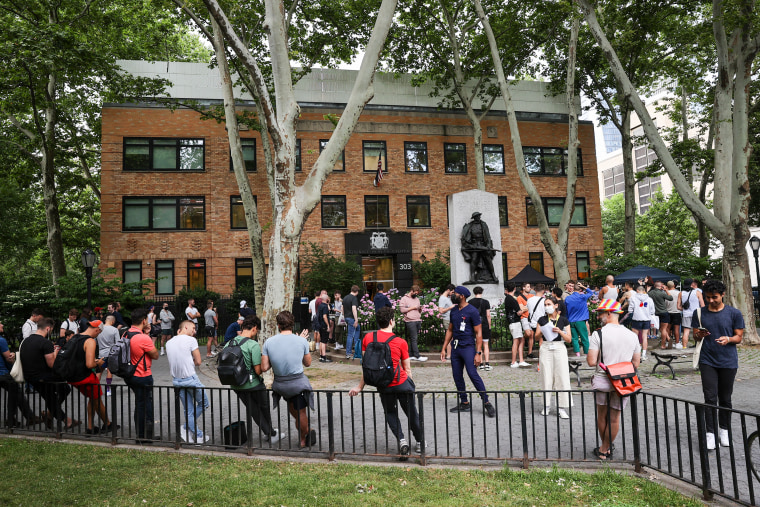
According to Amira Roess, a professor of global health and epidemiology at George Mason University, the wider public should also not be left with the false belief that monkeypox cases will never transmit substantially outside of gay and bi men’s circles, as experts such as herself widely expect the virus to do. “That belief will lead to broader complacency,” she said.
This dawning of yet another new potential pandemic arrives as the nation is already weary from the persistent Covid era, and as domestic terrorist groups and far-right voices have threatened Pride celebrations with violence and intimidation. Plus, Florida is grappling with a major outbreak of bacterial meningitis among men who have sex with men.
“The world is understandably tired of hearing about infectious diseases,” said Dr. Monica Gandhi, an infectious disease specialist at University of California, San Francisco. Referring to monkeypox, she added, “However, the good thing about this particular pathogen is that we have a pre-existing vaccine that can prevent it and be given to those who have been close contacts.”
On one hand, the public-health foot soldiers racing to spread the word about monkeypox at Pride events this weekend will benefit from a fortuitously timed window of opportunity to reach a massive, captive audience of those most at risk of infection. But on the flip side, some experts are concerned that these events will only fuel the virus’ transmission among people who could then carry the virus back to their homes in far-flung locations — primarily through a surge of sexual connections; and also possibly from skin-to-skin contact within tightly packed club venues.
“We have a real opportunity here during Pride especially to leverage the history of the LGBTQ+ community in being really fantastic community partners to get message out there, to engage with providers that care for this population and to get them access to our public health,” Dr. Ashwin Vasan, the commissioner of the New York City Department of Health and Mental Hygiene, told NBC News.
Dr. David Holland, chief clinical officer in the Fulton County Board of Health in Atlanta, is keen to keep monkeypox in perspective. The virus, he said, “is nothing like Covid.”
Monkeypox does not transmit anywhere nearly as readily as the coronavirus. If it can transmit through the air at all— the question is controversial and unsettled — monkeypox likely requires hours of very close contact to do so, many infectious disease experts have argued. Furthermore, while monkeypox can cause weeks of illness and in at least some cases can lead to severe pain, there have been no deaths during the current outbreak among people contracting the virus outside of Africa.
The Food and Drug Administration has approved the Jynneos vaccine, initially developed for smallpox, for monkeypox. Research suggests it may be about 85 percent effective at preventing monkeypox infection. The CDC is currently offering it as post-exposure prophylaxis to close contacts of those diagnosed, including health care workers.
On Thursday, New York became the first city in the nation to offer the monkeypox vaccine more broadly, specifically to men reporting multiple or anonymous male sex partners within the past 14 days. Demand was so great that within two hours of the sudden announcement that a single city clinic had begun offering vaccinations, scores of gay men were already waiting in line outside.
New Yorker Louis Jordan waited for four hours on Thursday for his vaccination. “The last time our country ignored a new disease that was spreading among gay men, it didn’t turn out too well,” the writer said, alluding to the AIDS crisis in the 1980s. “I think it’s important to protect myself if I can.”
During a tour of the clinic Friday morning, Vasan said offering vaccines “gives us a chance to slow this outbreak down.” He reported that the city, which was given 1,000 doses of the vaccine by the CDC, vaccinated 275 people on Thursday and is in talks with the agency to secure more.
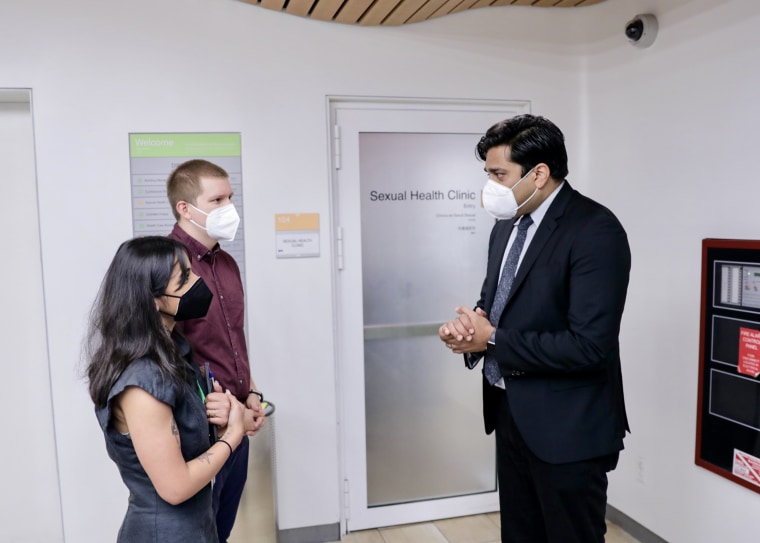
Dr. Brett Peterson, deputy chief of the poxvirus and rabies branch at the CDC, said at the agency’s advisory committee on immunization practices meeting on Thursday that he and his colleagues are in talks with departments of health in other U.S. jurisdictions about plans to expand monkeypox vaccinations as New York has. However, he noted that as of June 14, the nation had on hand only 36,000 courses of the Jynneos vaccine; about 4,000 people have begun the two-shot vaccine regimen so far. The U.S. is awaiting a shipment of about 150,000 additional two-dose courses in a few weeks, and some 750,000 courses will arrive later in the year.
“There are some supply limitations that we’re working to address and make sure that this medical countermeasure in particular is being provided and used in an optimal fashion but also an equitable fashion,” Peterson said.
Monkeypox typically causes a rash and raised sores, along with symptoms such as fever and swollen lymph nodes. It may be confused with sexually transmitted infections such as syphilis or herpes.
In cities staging major Pride events this weekend, state and local health departments have been gearing up for weeks to take advantage of the opportunity to educate the public about monkeypox. Pride organizers have worked with them, as well as with the CDC and InterPride, a global network of pride organizers, as they have helped set the stage for an informational blitz. Joining in are community-based nonprofits that have shepherded the gay community through four decades of the HIV epidemic, like Chicago’s Howard Brown Health and the San Francisco AIDS Foundation.
Pride workers and volunteers will be manning parades and other events, handing out flyers and palm cards. Monkeypox information also has been blasted out on the social media channels of Pride organizers and their partner organizations.
“What’s important is to really be innovative and creative about who we are reaching with the information age and being as clear as possible about what we know and what we don’t know,” said Adrianna Boulin, director of community impact and engagement at the LGBTQ-focused Fenway Health in Boston.
In addition, many of the major gay dating and hookup apps such as Grindr and Scruff have sent monkeypox alerts to their members in recent weeks.
André Thomas, co-chair of NYC Pride, said he feels a distinct pressure to meet this epidemiological moment. Not only is New York City’s Pride march the nation’s largest, but the city is also home to a disproportionately high number of monkeypox cases.
“All eyes are on us,” Thomas said. While he stressed that Pride can and should be a joyful celebration, especially after the drudgery of Covid, he cautioned: “We really want people to know, the messaging of us during Pride is, if you don’t feel well, don’t attend any of our events.”
Helping to drive the nation’s monkeypox response, including its messaging, is Dr. Demetre Daskalakis, head of HIV prevention at CDC. He previously held a similar position within the health department in New York City, which saw swiftly declining HIV diagnoses during his tenure.
Daskalakis and CDC Director Dr. Rochelle Walensky, whose background is also in HIV, have led monkeypox media briefings with an empathic chorus of anti-stigma messaging. In keeping with this strategy, they have tended to downplay in their public comments how the outbreak is spreading mostly among men who have sex with men. Daskalakis led the drafting of a harm-reduction-based, safer-sex guide that has been widely praised within the public health community as offering nonjudgmental advice designed to inform without alienating those at risk.
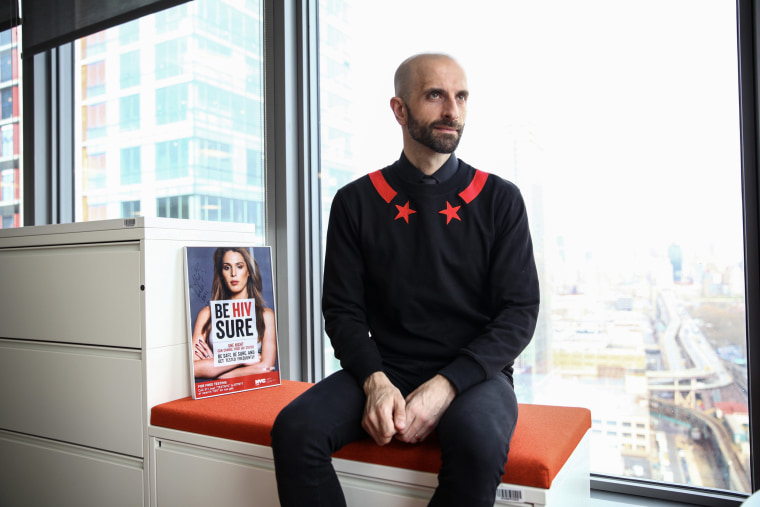
In an interview, Daskalakis highlighted gay and bisexual men’s resilience and sense of brotherhood in the face of a crisis — qualities he noted that the community has honed through grappling with HIV.
“If you give the right messaging to the right social network, people actually step up and do pretty amazing things,” Daskalakis said. He pointed to the group of gay men at the center of an outbreak of post-vaccination Covid-19 in Provincetown, Massachusetts, in the summer of 2021. They left state public health officials astonished by how meticulously and eagerly they documented the spread of the coronavirus among them — all in the name of public health.
“Gay men are especially used to reporting things and being open about their HIV status, for example,” Thomas said.
Whether such vigilance will help prevent the spread of monkeypox during certain higher-risk Pride events this weekend is a crucial question, infectious disease experts tell NBC News.
According to Anne Rimoin, a professor of epidemiology at the UCLA Fielding School of Public Health and one of the world’s leading monkeypox researchers, outdoor events will likely pose no substantial risk of monkeypox transmission. Club venues, however, are a concern, considering that people will be packed tightly together and will likely be baring considerable exposed skin.
Representatives from two of the biggest promoters of Pride-related club events in New York, Eric Michael Presents and Jake Resnicow Events, told NBC News that they have been working closely with the city’s health department on plans to distribute informational materials about monkeypox at their events this weekend. They have also put the word out to their tens of thousands of patrons and potential patrons via email not to show up if they have potential symptoms of monkeypox. Resnicow’s group has pledged to ask check-in screening questions related to the virus and has urged their patrons to get vaccinated at the city clinic immediately.
“We want to raise awareness but not sow panic,” said Eric Michael Vargas, Eric Michael Presents’ owner and operator.
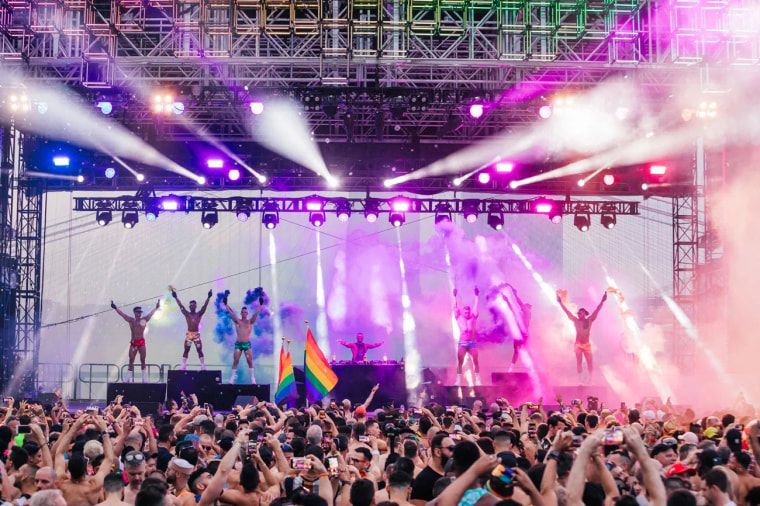
Some prominent voices have questioned the harm-reduction approach that the CDC has championed.
Former New York Times global health reporter Donald G. McNeil Jr. has published a series of unsparing essays on Medium where he has called for the postponing of any sex-centric Pride parties and the rapid scale-up of vaccination among at-risk men who have sex with men. McNeil faults the CDC for, as he sees it, overprioritizing combating anti-gay stigma over the urgent need to communicate frankly and precisely about the true contours and drivers of the outbreak.
“I fear Pride celebrations will be a series of superspreader events,” McNeil told NBC News. “And that they will make this epidemic uncontainable.”
In an interview, syndicated sex columnist Dan Savage called for gay and bisexual men to be vigilant about monitoring for potential symptoms of the virus and to “err on the side of caution if you have a hint of symptoms or have been in contact with someone who has been exposed” — sitting out club nights or sexual experiences if warranted.
“Sexual freedom is awesome,” Savage said. “It’s a superpower. It comes with a responsibility — which is not to be in denial. We have to be informed and take responsibility. And maybe every once in a while tap the breaks.”
